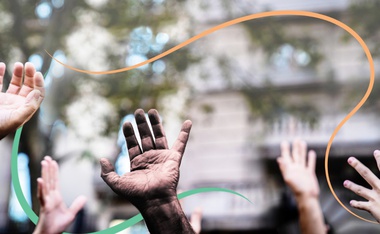The views expressed in our content reflect individual perspectives and do not represent the authoritative views of the Baha'i Faith.
Working with a local interfaith coalition called “A Mighty Stream: An Interfaith Community of Sacred Activists for Racial Justice” has given Baha’is in my community the opportunity to share some of our teachings.
What often happens in interfaith groups is that people turn to familiar ways of effecting social change by using intellectual approaches – but some point out that people of religion bring a spiritual approach that other groups don’t offer. Our local interfaith group is a unified and loving one whose members accept each other’s differences and can disagree but love each other. We’ve had frank discussions in the local interfaith group about not allowing ourselves to become just another social activist group in the mold of so many civic ones, but to strive for a spiritual unity among ourselves and continue to widen our circle.
RELATED: Beyond Interfaith Dialogue to Interfaith Friendships
So in our racial justice efforts we’ve divided into two categories: the Racial Inequities Series and the Faith Perspectives on Racial Justice Series, both of which have been delivered in Zoom internet webinars this year. The Faith Perspectives series had four webinars, each with five faith representatives. Because Baha’is have no clergy, individuals are called upon to fill in: I’m the Baha’i who participated last spring on one of the panels, along with an Episcopal minister, a non-denominational Christian minister, a Buddhist, and a representative from the Native American Coalition. Our task: to share what our religions teach about racial justice and explain how each of our congregations respond to those teachings.
Here’s a summary of what I presented (in nine minutes) as my perspective on Baha’i efforts for race unity. For Baha’is, the unity of God, religion and humanity are core principles. They involve eliminating all prejudices, one of the most egregious of which is the prejudice of race. The prophet and founder of the Baha’i Faith, Baha’u’llah wrote “The well-being of mankind, its peace and security, are unattainable unless and until its unity is firmly established.”
Baha’u’llah designed a spiritual organization that enables and encourages unity. Baha’i community life functions without clergy and with no hierarchy. The only authority comes from the Baha’i writings.
Also, Baha’is democratically elect our local, national and international Assemblies by secret ballot without nomination, discussion, campaigning, or electioneering. If a tie vote involves someone of a racial or ethnic minority in the community, that person takes the seat. These nine-member Assemblies make decisions only when in session, but its members have no individual authority.
The Baha’i community gathers every 19 days for Feast, where we worship, consult about community affairs, and socialize together. Baha’i consultation – a unique process where individuals strive for a unified vision – helps find the spiritual truth in any situation. All voices are encouraged to offer their perspectives. Once offered in consultation, any idea belongs to the entire group. Baha’is eschew political approaches involving voting and individual ownership of ideas, which can tend toward divisiveness. Because Feast consultation is designed so all members meet as equals and each can speak up about community matters, such a structure can serve as a model for creating organic change in society.
Baha’i history attests to the ongoing work the community has accomplished. For example, racial justice work in the Baha’i Faith really began with Abdu’l-Baha’s visit to the American continent in 1912, as soon as he was released from prison where he’d been exiled along with his father Baha’u’llah and the rest of the family. In his travels in North America, Abdu’l-Baha could see the gravity of the race problem and urged “Now is the time for the Americans to unite both the white and colored races. Otherwise, hasten ye towards destruction!” He predicted that unity between Blacks and Whites “… will be a cause of the world’s peace.”
Abdu’l-Baha set a memorable example for how to cut through protocols and create relationships. He was a guest in the home of Agnes Parsons, a Baha’i woman married to a diplomat. She was a White woman prominent in Washington, D.C. high society in the Jim Crow South, and behaved in ways befitting her social station. For example, when Abdu’l-Baha gathered together her Black servants to speak encouragingly to them, Agnes declined to be present, unable to conceive of mixing with servants.
One day, Abdu’l-Baha was invited to speak at Howard University, accompanied to campus by Louis Gregory, a Black Baha’i lawyer and Howard University professor. After the talk, Louis Gregory brought Abdu’l-Baha back to the Parsons’ home where Agnes was hosting a dinner to which Louis hadn’t been invited. When Abdu’l-Baha saw him starting to leave, he called him back and instructed Louis to sit next to him in the seat of honor, thus setting an example to all present as if to say, this is how we treat each other.
When veterans were returning home in 1919 after World War I, White servicemen started a race riot, an event that Agnes undoubtedly knew about. The following year, she visited Abdu’l-Baha in Haifa and he urged her to arrange a convention for unity between White and Black people – and she did. This woman – who hadn’t wanted to accompany Abdu’l Baha as he spoke with her servants and hadn’t arranged for Louis Gregory to sit at her dinner table – organized the first Race Amity Conference, which was followed by four more between 1921-24. The event became known as Race Unity Day, now sponsored officially by the Baha’is and observed throughout the world on the second Sunday in June. Anyone can organize an event.
RELATED: How the Baha’i Teachings Inspire Positive Race Relations
Many examples exist of how the Baha’i administration has dealt with race issues. After the passing of Abdu’l-Baha, Baha’i administrative bodies responded, with local Baha’i communities developing initiatives that made sense in their areas. These efforts have continued. Some recent highlights at the national and international levels include the 1991 National Spiritual Assembly’s release and circulation of their public statement, “The Vision of Race Unity: America’s Most Challenging Issue,” and in 1997 the release of a video, “The Power of Race Unity” that was televised throughout the country. In 2011, the Baha’i international body, the Universal House of Justice, noted the altered dynamics of prejudice: “The expressions of racial prejudice have transmuted into forms that are multifaceted, less blatant, more intricate, and thus more intractable.” This tells us that over the past century, where not enough work has been done nationally, racism has become more entrenched. We’ve all witnessed some signs of that, but are also now seeing more people address the many issues connected with racism.
The Baha’i International Community, a non-governmental organization with a seat at the United Nations, is developing and advocating a universal culturally adaptable curriculum be adopted, focusing on the organic oneness of humankind, so that children at a young age will internalize the reality of human unity and equality.
Abdu’l-Baha’s life provides an example of how to create fellowship by finding opportunities to interact with other faiths and ethnicities, with whom we can rise above worldly concepts based on material thinking, appreciate each other’s spiritual attributes, get to know each other as individuals, and learn what conditions people are experiencing. When that happens, the Baha’i teachings say, the love of God will prevail:
… there is need for a superior power to overcome human prejudices, a power which nothing in the world of mankind can withstand and which will overshadow the effect of all other forces at work in the human conditions. That irresistible power is the love of God …
















Comments
Sign in or create an account
Continue with Googleor